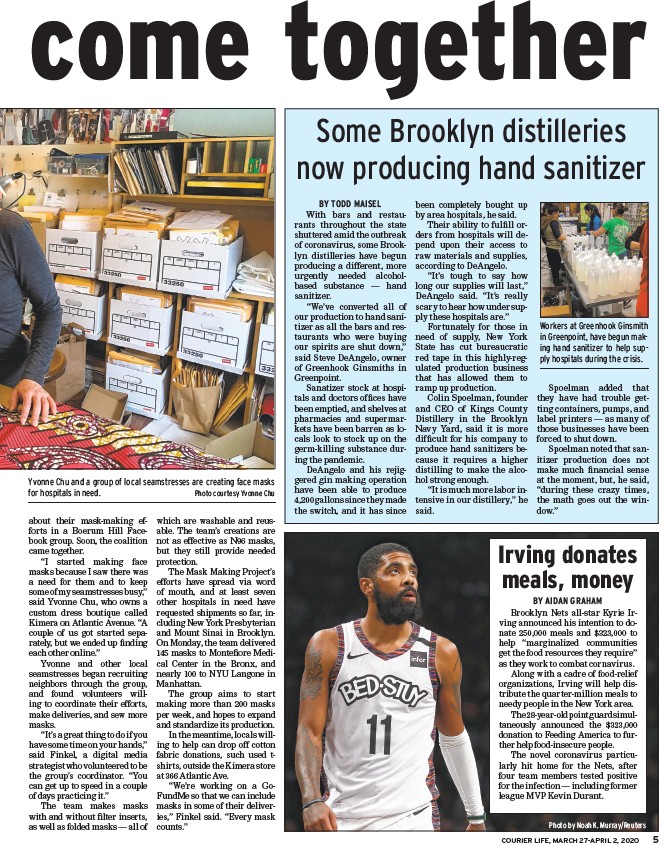
come together
Some Brooklyn distilleries
now producing hand sanitizer
Workers at Greenhook Ginsmith
in Greenpoint, have begun making
hand sanitizer to help supply
hospitals during the crisis.
Irving donates
meals, money
BY AIDAN GRAHAM
Brooklyn Nets all-star Kyrie Irving
announced his intention to donate
250,000 meals and $323,000 to
help “marginalized communities
get the food resources they require”
as they work to combat cornavirus.
Along with a cadre of food-relief
organizations, Irving will help distribute
the quarter-million meals to
needy people in the New York area.
The 28-year-old point guard simultaneously
announced the $323,000
donation to Feeding America to further
help food-insecure people.
The novel coronavirus particularly
hit home for the Nets, after
four team members tested positive
for the infection — including former
league MVP Kevin Durant.
COURIER LIFE, MARCH 27-APRIL 2, 2020 5
BY TODD MAISEL
With bars and restaurants
throughout the state
shuttered amid the outbreak
of coronavirus, some Brooklyn
distilleries have begun
producing a different, more
urgently needed alcoholbased
substance — hand
sanitizer.
“We’ve converted all of
our production to hand sanitizer
as all the bars and restaurants
who were buying
our spirits are shut down,”
said Steve DeAngelo, owner
of Greenhook Ginsmiths in
Greenpoint.
Sanatizer stock at hospitals
and doctors offi ces have
been emptied, and shelves at
pharmacies and supermarkets
have been barren as locals
look to stock up on the
germ-killing substance during
the pandemic.
DeAngelo and his rejiggered
gin making operation
have been able to produce
4,200 gallons since they made
the switch, and it has since
been completely bought up
by area hospitals, he said.
Their ability to fulfi ll orders
from hospitals will depend
upon their access to
raw materials and supplies,
according to DeAngelo.
“It’s tough to say how
long our supplies will last,”
DeAngelo said. “It’s really
scary to hear how under supply
these hospitals are.”
Fortunately for those in
need of supply, New York
State has cut bureaucratic
red tape in this highly-regulated
production business
that has allowed them to
ramp up production.
Colin Spoelman, founder
and CEO of Kings County
Distillery in the Brooklyn
Navy Yard, said it is more
diffi cult for his company to
produce hand sanitizers because
it requires a higher
distilling to make the alcohol
strong enough.
“It is much more labor intensive
in our distillery,” he
said.
Spoelman added that
they have had trouble getting
containers, pumps, and
label printers — as many of
those businesses have been
forced to shut down.
Spoelman noted that sanitizer
production does not
make much fi nancial sense
at the moment, but, he said,
“during these crazy times,
the math goes out the window.”
about their mask-making efforts
in a Boerum Hill Facebook
group. Soon, the coalition
came together.
“I started making face
masks because I saw there was
a need for them and to keep
some of my seamstresses busy,”
said Yvonne Chu, who owns a
custom dress boutique called
Kimera on Atlantic Avenue. “A
couple of us got started separately,
but we ended up fi nding
each other online.”
Yvonne and other local
seamstresses began recruiting
neighbors through the group,
and found volunteers willing
to coordinate their efforts,
make deliveries, and sew more
masks.
“It’s a great thing to do if you
have some time on your hands,”
said Finkel, a digital media
strategist who volunteered to be
the group’s coordinator. “You
can get up to speed in a couple
of days practicing it.”
The team makes masks
with and without fi lter inserts,
as well as folded masks — all of
which are washable and reusable.
The team’s creations are
not as effective as N96 masks,
but they still provide needed
protection.
The Mask Making Project’s
efforts have spread via word
of mouth, and at least seven
other hospitals in need have
requested shipments so far, including
New York Presbyterian
and Mount Sinai in Brooklyn.
On Monday, the team delivered
145 masks to Montefi ore Medical
Center in the Bronx, and
nearly 100 to NYU Langone in
Manhattan.
The group aims to start
making more than 200 masks
per week, and hopes to expand
and standardize its production.
In the meantime, locals willing
to help can drop off cotton
fabric donations, such used tshirts,
outside the Kimera store
at 366 Atlantic Ave.
“We’re working on a Go-
FundMe so that we can include
masks in some of their deliveries,”
Finkel said. “Every mask
counts.”
Photo by Noah K. Murray/Reuters
Yvonne Chu and a group of local seamstresses are creating face masks
for hospitals in need. Photo courtesy Yvonne Chu